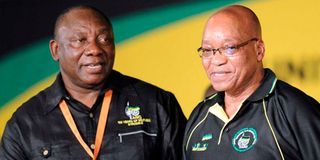Ramaphosa's dilemma: Protect the law or pardon Zuma to ease tensions?

South African President Cyril Ramaphosa and ex-President Jacob Zuma.
South African President Cyril Ramaphosa may now hold the key to his predecessor’s fate, even as the former leader starts a second week in jail.
Jacob Zuma was incarcerated on Wednesday last week after the Constitutional Court found him guilty of contempt of court for disregarding an order to testify at the State Capture Inquiry.
But that has led to protests, initially in his native KwaZulu Natal Province before snowballing to Gauteng.
Mr Zuma, who served as the fourth president of South Africa between 2009 and 2018, was sentenced to 15 months behind bars at the Estcourt Correctional Facility, where prison officials said he would be treated as an ordinary prisoner.
But whether to follow the law and keep him locked up or free him to calm restive supporters is something the ruling ANC party is grappling with.
The #FreeZuma violent protests broke out in his home province KwaZulu Natal, with trucks being burnt and shops being looted. The demonstrations on Monday spread to Gauteng, particularly Johannesburg, with six people reported dead.
President Ramaphosa reportedly spoke to KwaZulu-Natal premier Sihle Zikalala and asked for an update on the violent protests.
Consider pardon
Mr Zikalala is on record saying he believed the president should consider pardoning Mr Zuma in a quest to calm tensions. However, political insiders dismissed the suggestion as premature and misplaced.
At a national executive council meeting where the Constitutional Court judgment and its implications were discussed on Monday, President Ramaphosa lectured party leaders that the ruling African National Congress (ANC) must act and be seen to be the leader of society.
“If the leadership of the ANC is not respected, we cannot say we lead society. Leadership is earned through illustrating to the people that we respect them, respect the laws of the country and conduct ourselves with humility and integrity. We must deal with the issue of discipline and adherence to and respect for the constitution of the ANC,” he said.
As the violent acts play out, the one question that has been raised is whether President Ramaphosa has the authority to grant his 79-year-old predecessor a ‘presidential pardon’.
Of course, pressure is mounting from the public, as well as from prominent figures, to pardon Mr Zuma.
The former director-general in the presidency, Rev Frank Chikane, said he supports the idea of a presidential pardon if Mr Zuma applies for it, but only if he admits to his mistakes.
Mr Chikane said presidential pardons “are the prerogative of the president, there are rules that govern pardons”. He believes pardons should only be granted if the person applying for it admits to wrongdoing.
“People who apply for pardons would be those who say, ‘I’ve made a mistake, I shouldn’t have done this’. You can’t defy the courts and then ask for pardon,” he said.
For him, it would only apply if Mr Zuma apologises and is “being accountable”.
“You can’t say you want a pardon but ‘I’m not going to account for my actions’. The two things can’t go hand in hand. This is my personal view about pardoning.”
'National shutdown'
BLF leader Andile Mngxitama, a known ally of Mr Zuma, called for a national shutdown until the beleaguered former leader was given an “unconditional and immediate release”.
“Only those who were serious about revolutionary change and confronting the real enemy know that one ought to defend Zuma and expose the enemy – the white monopoly capital and its agents,” he claimed.
“Zuma is our symbol against the enemy. He took a stand. That’s why he had to leave the office, that’s why he was jailed. They won’t stop there because they don’t trust that he won’t raise the masses against them.”
Political analyst Mandla Mzimela said while the constitution was clear that the president had the right to pardon a fellow citizen, it would all depend on whether Mr Zuma is willing to “beg for pardon”.
“It’s politics at play and he may not want to beg for pardon seeing that people outside are fighting for his release. In the bigger scheme of things, this is a show of a dramatic power shift within the ANC,” Mr Mzimela told Nation.Africa.
“The head of state would still be encouraged by the department of justice to rule in a certain manner, but the ultimate decision lies with the person elected to run the country. The question is whether Zuma would be willing to go down that route?”
He, however, noted that the process could take a couple of months “due to the involvement of various role players”.
Under Section 84 of the constitution: “The president has the powers entrusted by the constitution and legislation, including those necessary to perform the functions of head of state and head of the national executive. Therefore, they are responsible for… pardoning or reprieving offenders and remitting any fines, penalties or forfeitures.”
Mr Mzimela, however, warns a move to expedite Mr Zuma’s release could also attract a backlash from opposition parties, who have always called for the troubled leader to be held accountable for his transgressions.
Nonetheless, ‘Msholozi’, as Mr Zuma is affectionately known, is technically able to apply for a presidential pardon. But sadly for him, the power to actually enact the pardon lies solely with a man he finds himself at loggerheads with – President Ramaphosa.
The problem, though, is that violent protests and the gathering of looters could just worsen the spreading of Covid-19. Officials are banking on the deployment of the South African defence forces to help reduce the violence.




